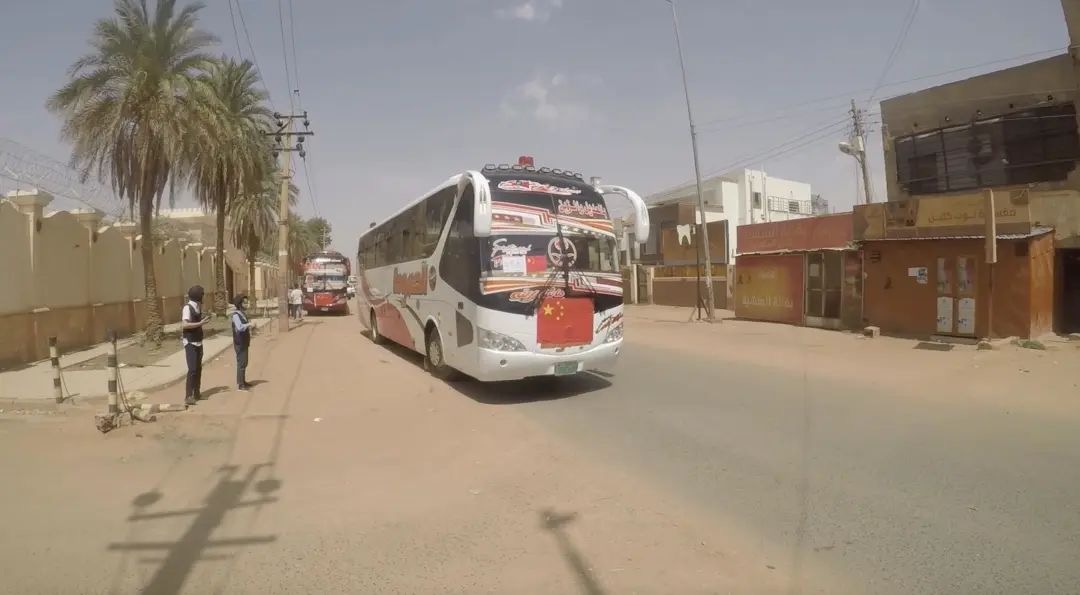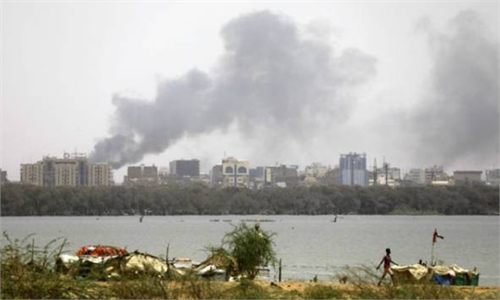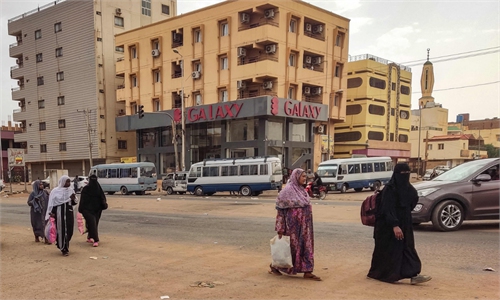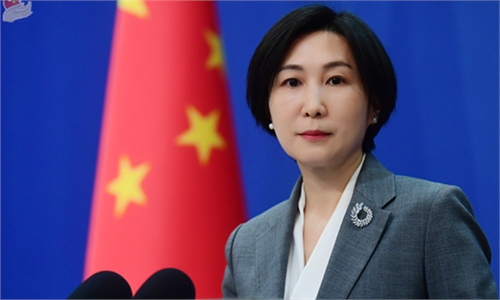Details on evacuation of Chinese nationals from Sudan unveiled, with help of Chinese Embassy

A bus carrying Chinese nationals evacuates Khartoum, the capital city of Sudan. Photo: Xie Jiajun
For Chinese nationals living in Sudan the night on April 23 was a sleepless one. Not only because of occasional gunshots, but also because of the anticipation and nervousness brought by the announcement of the Chinese Embassy to evacuate Chinese citizens living in war zones of Khartoum.
Zhang Xianghua, the temporary Chargé d'Affaires of the Chinese Embassy in Sudan, had hardly slept for several days. "The most difficult is the information chaos brought by the continuation of the conflict. The primary task of the Ministry of Foreign Affairs and the Party committee of the embassy is to find a flawless evacuation route and destination among many plans in order to ensure the safety of every Chinese citizen," said Zhang.
At 5 am on April 24, Zhang began organizing evacuation work, dragging his tired body, rubbing his bloodshot eyes, taking a few big gulps of water and putting on a heavy duty bulletproof vest and helmet. At that time the usual "wakeup gunshots" surprisingly did not ring out.
When advancing to the temporary evacuation assembly point set up nearby the embassy in Khartoum, a Global Times reporter attempted to speak with Zhang by starting "What is our evacuation route today?"
"I apologize, I cannot talk about it, because of the large number of people. It is a huge target. To ensure safety of our evacuation, it is still best to stay low-key as much as possible," Zhang replied.
Whena Global Times reporter arrived at the evacuation point, a large number of Chinese compatriots had already formed a queue.
The head of the defense attaché of the embassy, Ding Feng, who was in charge of organizing evacuation, was seen with two walkie-talkies strapped to his waist.
"One is for the use of embassy staff contact, one is for the exclusive use of my wife. Not because of household chores, but because I am in charge of the evacuation, I'm afraid my superiors cannot contact me in real time, so my wife can wait on the phone and informs me in time with a walkie-talkie," Ding said.
Just when everyone thought that the evacuation that day would go smoothly, unexpectedly accidents still occurred. The local bus drivers broke their promises, with some saying they could not enter the war zone and some bargaining by negotiating at the last minute. There was only one bus driver that kept his promise and showed up at the designated assembly point.
The embassy Party committee soon gathered to discuss adjusting their approach. Ding said that since more than 400 compatriots had already gathered, so if evacuation could not be completed, it would bring greater hidden dangers to the lives, property and safety of everyone.
"No matter the cost, we must contact all possible enterprises and bus drivers to allow compatriots to evacuate as soon as possible," Zhang said resolutely.
Waiting for buses to come was the biggest challenge. On the day of the evacuation, gunfire could still be heard around the embassy, and some compatriots even took photos of fighter jets launching rockets artillery toward the ground. Sudanese supporting force driving pickups would also frequently pass by the evacuation team from time to time.
"Can you dispatch a few buses? Six? That would be great!" said Guo Hu, commercial counselor of the embassy, who wore a bullet-proof vest while sweating profusely. He had already lost count of the order of this call, and Guo had no choice but to repeatedly contact all possible people to look for buses.
Eventually Nile petrochemicals company affiliated with the China National Petroleum Corporation provided some seats on their own evacuation buses to support the embassy's evacuation of compatriots. "At a critical moment, our own enterprises are still reliable!" said Guo wiping off the sweat on his forehead.
In the long evacuation queues, there were older people and children, Chinese citizens and their family members. Not a word of complaint was heard, only the tolerance, understanding and mutual assistance shown by compatriots waiting to be evacuated during the long waiting time.
They spontaneously chose a "captain" for each vehicle and uniformly coordinated and contacted each other; some volunteers passed national flags on the bus windows; some volunteered assisted those who felt unwell and provided food and water; there were also volunteers who agreed to use their private cars as lead vehicles to guide the evacuation convoy.
With the joint efforts of the embassy, enterprises and chamber of commerce, this assembly ofChinese citizens and their families were all successfully evacuated.
A Chinese employee stationed in the capital of Sudan, who requested anonymity, is one of the Chinese nationals to have been evacuated. He told the Global Times he had reached the border of Egypt after travelling more than 1,000 kilometers from Khartoum on a bus carrying some 50 Chinese people. After staying in Egypt for about two days, he is scheduled to return to China.
"As now most compatriots have been evacuated, the remaining compatriots will become more dispersed. But the country will not abandon any compatriot. We must take everyone home!" Zhang said, vowing to continue their evacuation.
"Chinese people all felt safe and blessed for being protected by the country," Cui Yujiang, who has lived and worked in Sudan for over 10 years, told the Global Times. Cui is the one still waiting for an evacuation plan from the embassy.
For Chinese diplomats stationed in the Sudanese embassy, their battle is far from over. some followed the evacuation team; some were still communicating with locals about renting vehicles; several female diplomats patiently called every Chinese national who did not reach the evacuation point to tell them to join the next batch of evacuation.
"Chinese diplomats will always be with their compatriots in Sudan and do everything possible to ensure their safety," Mao Ning, a spokesperson for the Chinese Foreign Ministry, emphasized on Tuesday.
China is organizing the evacuation of Chinese citizens to neighboring countries from Sudan by land and sea. From April 25 to 27, nearly 800 Chinese are expected to be transferred. More than 300 people have left for neighboring countries by land, Mao said on Wednesday.
The Chinese embassies in Egypt, Ethiopia and Eritrea are closely monitoring the security situation, and have sent assistance teams along the border ports to assist Chinese nationals seeking to evacuate from Sudan amid escalating conflict in the country.
"In the past two years, inflation and depreciation in Sudan have been brought under control, and Sudan still has potential for economic development. We also hope that when peace is restored we will be able to go back to seek opportunities," a Chinese employee who had been stationed in Sudan told the Global Times.




